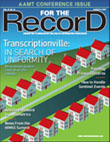August 6 , 2007
 Coding for Posttraumatic Stress Disorder
Coding for Posttraumatic Stress Disorder
For The Record
Vol. 19 No. 16 P. 32
Posttraumatic stress disorder (PTSD) is an anxiety disorder following exposure to a life-threatening or overwhelmingly traumatic event in which the person repeatedly relives the incident through nightmares and flashbacks. Referred to as shell shock and battle fatigue in the past, PTSD can be caused by war, kidnapping, serious car or train accidents, natural disasters, violence, abuse, and torture. PTSD can be triggered by an event that happens directly to or is witnessed by an individual and can occur at any age.
Types of PTSD
Chronic or prolonged PTSD (ICD-9-CM code 309.81) may never disappear but may become less intense over time. There may be periods of remission and relapses.
Acute or brief PTSD (309.81) has the same characteristics as chronic PTSD, but it usually begins within four weeks of the traumatic event and lasts from a few hours to a few weeks.
Symptoms
The symptoms of PTSD, which may not begin for months or years after the traumatic events, include the following:
• persistent frightening memories and thoughts;
• shame or guilt;
• flashbacks and nightmares;
• difficulty sleeping;
• difficulty concentrating;
• memory impairment;
• irritability;
• aggressive or violent feelings and behavior;
• withdrawal, numbness, or loss of interest in activities that used to be enjoyable;
• depression;
• easily startled; and
• trouble feeling affectionate.
Diagnosis
A PTSD diagnosis is based on structured interviews, questionnaires, and physiological assessments. The diagnostic criteria for PTSD is as follows:
• History of exposure to a traumatic stressor/event is marked by intense fear, helplessness, or horror.
• Experiencing symptoms of flashbacks/nightmares, avoidance/numbness, and hyperarousal. The individual must experience significant social, occupational, or other distress as a result of these symptoms.
• Symptoms last longer than one month (for chronic PTSD).
Many patients also have an alcohol or drug dependency in addition to PTSD. This is often due to the patient’s attempt to control PTSD reactions. Additional diagnoses, if present, should also be coded as follows:
• Alcohol abuse (305.0x);
or
• Drug abuse (305.2x-305.9x).
Other diagnoses associated with PTSD should also be coded as follows:
• Major affective disorders (296.xx);
• Dysthymia (300.4);
• Anxiety disorders (300.00 — specific code assignment may depend on specified type of anxiety);
• Panic attacks (300.01 — specific code assignment may depend on specified type of panic attacks); or
• Personality disorders (301.xx).
Treatment
Although there is no cure or definitive treatment for PTSD, the individual may be treated with one or a combination of the following:
• Cognitive-behavioral therapy (CBT) — involves working with cognitions to change emotions, thoughts, and behaviors. Types of CBT include exposure therapy, breathing retraining, biofeedback, cognitive restructuring, and stress inoculation.
• Drugs such as antidepressants to reduce depression and antianxiety medications to decrease sleep problems. These medications may help relieve the distress and emotional numbness caused by trauma memories. The most widely used drugs for PTSD are selective serotonin reuptake inhibitors such as Prozac and Zoloft.
• Psychotherapy — focuses on the emotional conflicts caused by the traumatic event.
Coding and sequencing for PTSD are dependent on the physician documentation in the medical record and application of the Official Coding Guidelines for inpatient care. Also, use specific AHA Coding Clinic for ICD-9-CM and American Medical Association CPT Assistant references to ensure complete and accurate coding.
— This information was prepared by Audrey Howard, RHIA, of 3M Consulting Services. 3M Consulting Services is a business of 3M Health Information Systems, a supplier of coding and classification systems to nearly 5,000 healthcare providers. The company and its representatives do not assume any responsibility for reimbursement decisions or claims denials made by providers or payers as the result of the misuse of this coding information. More information about 3M Health Information Systems is available at www.3mhis.com or by calling 800-367-2447.



